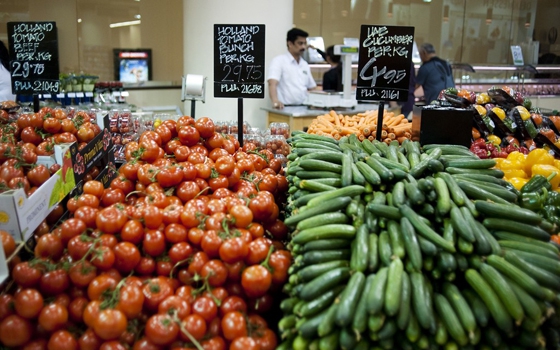Abu Dhabi is looking to alternative methods to secure food supplies to feed its growing population.
Food security and a sustainable agriculture sector make up one of the main pillars in the government’s new five-year development plan, known as the Abu Dhabi Plan, which was unveiled in June.
With constraints on the expansion of local production because of the emirate’s climate, the government is increasingly partnering with the private sector to increase agricultural imports and promote food security.
Coordination of these efforts is set to be crucial in maintaining a diversified and sustainable supply chain in coming years.
Bringing private companies into the fold
As part of the government’s strategy, the private sector is being encouraged to invest in agri-business, particularly through international projects.
To this end, last year the Abu Dhabi Food Control Authority signed contracts with a number of Abu Dhabi-based firms, including Al Dahra and Jenaan Investment, a private company investing in diversified agricultural projects, to ensure the supply of fodder for the next five years through increased investment in a number of countries.
Abu Dhabi-based Al Dahra, which specializes in animal feed and food commodities, manages a land portfolio of around 81,000 ha with operations in more than 20 countries. Meanwhile, Jenaan Investment operates in Sudan, Egypt, Spain and the US, and in 2013 the company invested $400bn in eight Serbian agricultural firms to grow food and fodder for export.
Despite continued investment, however, agricultural companies sometimes face challenges abroad, particularly in developing countries. Oftentimes, the local regulatory framework and infrastructure is under developed, with many countries rich in agricultural resources also prone to political and economic risk, according to a 2013 food security briefing by UK think tank Chatham House.
Shifting priorities
The focus on increased agricultural investment comes on the heels of rising food costs.
The spike in international food prices in 2007-08 can be seen as the main driver of change in food security strategies as many countries in the Middle East struggled to ensure the supply of basic food commodities, according to Khalifa Al Ali, managing director of the Food Security Centre – Abu Dhabi (FSCAD), which was established in 2010 to sustain the food supply with the vision of enabling all citizens and residents of the UAE to have access to healthy, nutritious and safe food under all circumstances, including emergencies and crises.
“Feed for the livestock sector has become one of the main concerns for food security, with the total animal population exceeding 3.5m head in Abu Dhabi alone. Animal feed, particularly Rhodes grass, used to be planted in Abu Dhabi in the thousands of tons, with huge consumption of domestic underground water,” he told OBG. “Due to this reason, the government issued legislation to stop the local production of animal feed and start importing and encouraging vertical investment abroad.”
“Currently, about 1.5m tons of feed is imported in 90,000 containers each year. It’s a big business, and very much a part of the nation’s food security even though it is produced abroad,” Al Ali added.
According to Chatham House, self-sustainable agriculture is not possible in the GCC as “domestic production meets only a small proportion of needs, yet consumes significant economic resources and almost monopolizes water use”.
The UAE imports 85% of its food requirements, with total expenditure on food expected to quadruple to $400bn over the next 10 years, Sultan bin Saeed Al Mansoori, minister of economy, told local media last year.
Local production and resources
To further facilitate food security, projects to maintain the current levels of local production are underway.
The UAE’s agricultural sector absorbs 34% of the nation’s groundwater supply, according to a study by the UAE University. Groundwater itself accounts for 51% of the country’s needs, with treated wastewater contributing 12%.
With depleting groundwater reserves, treated wastewater is considered a major opportunity going forward in terms of irrigation.
Earlier this year Mohamed Dawoud, adviser for water resources at the Environment Agency – Abu Dhabi, announced plans to build a pipeline to deliver 140m cu meters of water from the desalination plant in Musaffah to other areas of the emirate, effectively doubling the amount of treated wastewater available to farms by 2020, according to press reports.
Oxford Business Group
12 October
























































